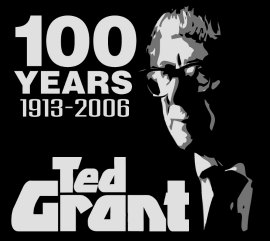 Today, 9th July, marks the 100th anniversary of the birth of Ted Grant, the founder of the International Marxist Tendency. Rob Sewell, editor of the British Marxist paper Socialist Appeal, outlines the important role played by Ted in building the forces of Marxism during his lifetime and discusses the legacy of Ted for Marxists today.
Today, 9th July, marks the 100th anniversary of the birth of Ted Grant, the founder of the International Marxist Tendency. Rob Sewell, editor of the British Marxist paper Socialist Appeal, outlines the important role played by Ted in building the forces of Marxism during his lifetime and discusses the legacy of Ted for Marxists today.
For those who knew him, Ted Grant was a political giant. He lived and breathed the ideas of Marxism and was, without doubt, the most important Marxist theoretician since the death of Trotsky. This can be gauged by the depth of his writings over some 70 years of political activity, most of which is available at tedgrant.org.


 Today, 9th July, marks the 100th anniversary of the birth of Ted Grant, the founder of the International Marxist Tendency. Rob Sewell, editor of the British Marxist paper Socialist Appeal, outlines the important role played by Ted in building the forces of Marxism during his lifetime and discusses the legacy of Ted for Marxists today.
Today, 9th July, marks the 100th anniversary of the birth of Ted Grant, the founder of the International Marxist Tendency. Rob Sewell, editor of the British Marxist paper Socialist Appeal, outlines the important role played by Ted in building the forces of Marxism during his lifetime and discusses the legacy of Ted for Marxists today.